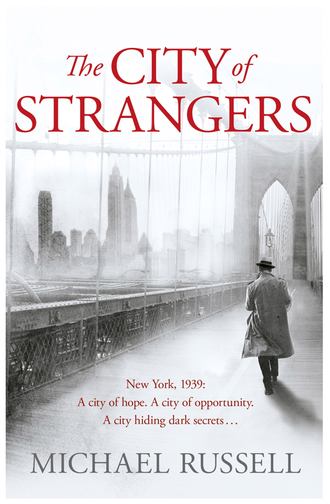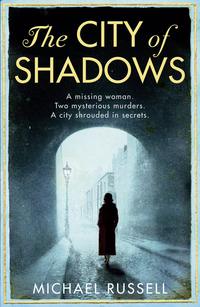
Полная версия
The City of Strangers
‘There are only so many people who’d know how to plant a bomb.’
‘Well,’ shrugged Carroll, ‘the British must be shaken up by it now.’
‘I would be,’ Stefan nodded. ‘I’d be pretty pissed off if I lived in Barnes and I had to go all the way down to Putney to find a bridge. I wouldn’t put it much stronger than that. Unless London County Council’s very short on lamp standards, I wouldn’t say it’ll keep anybody awake.’
As this conversation had started there had been a look of amused satisfaction on the American’s face. Stefan believed he could read it easily enough. He had sat in pubs with enough American-Irish singers of Republican songs to know that though ‘Up the IRA’ was a cry that was hardly on many lips in Ireland, the enthusiasm in New York and Boston and Chicago was unaffected by the fact that the IRA wasn’t only at war with Britain, it was still ideologically at war with the government of Ireland itself. It wasn’t an argument he intended to start. Carroll could have his opinions.
‘You’re one of Ned Broy’s men all right, Mr Gillespie. Goodnight.’
The words were said with something like a grin, almost with a wink, but there was something colder in the words than anything that had gone before. They were words that no guard could fail to understand, and they came from somewhere that was about more than singing rebel songs.
To be one of Ned Broy’s men was to be more than just a lackey of the illegitimate entity that Republicans still referred to contemptuously as the Free State; it was to be an informer, a traitor, a killer. Wasn’t the Commissioner a turncoat, like de Valera and all his crew, an IRA man himself who had brought ex-IRA men into the Gardaí to hunt down their old comrades, to imprison them, to torture them, sometimes to kill them? And it was true enough. The men Ned Broy had brought into the Garda Special Branch had done all that. Their reasons didn’t make the bare facts any more palatable.
That none of this had anything to do with Stefan Gillespie didn’t mean he couldn’t feel the contempt behind Dominic Carroll’s parting wink, or that he didn’t sense now that the man was no idle wearing-of-the-green, up-the-rebels American-Irish tourist. He was a political Republican, and as a wealthy and influential man in New York he probably mattered in Republican politics, whether it was in America or Ireland, and it was likely both.
Stefan remembered that Carroll had expected him to know who he was. If he really was someone, it was unlikely he hadn’t had a Special Branch tail on him while he was in Ireland, or that he wouldn’t have been aware of it. The suspicion he had shown, on finding a Garda officer sitting opposite him on a plane to New York, with apparently no very good reason to be there, finally made sense.
It was 5.30 in the morning when the Yankee Clipper bumped down into the waters of Botwood, Newfoundland, and was tied up at the end of the long pier at the western end of the small harbour. Stefan Gillespie had not been able to sleep. For a while there had been the rattle of conversation and laughter and the clink of glasses from further down the cabin, where a group of passengers was playing canasta, but it had been silent for several hours now. The soft buzz of the engines, and the occasional grunt and snore from behind the curtains across the aisle, were the only sounds.
It was an odd feeling, cocooned up here, sailing through the night sky. He felt apart, not just from the world below in general, but from his own life in particular. He wasn’t in the habit of stepping back from himself, and he wasn’t entirely sure he liked doing it, but here, hanging in the darkness, it was hard not to do it. There was a lot in his head. Ned Broy and Owen Harris and Dessie MacMahon and Terry Gregory; Valerie Lessingham and Tom and his parents; the wide-ranging conversation with Dominic Carroll, about Ireland and New York and the prospect of war and Hammersmith Bridge and loss and grief and the sheep on the mountainside at Kilranelagh. And he kept coming back to the question a stranger had asked that he hadn’t asked himself in a very long time: what are you doing, sitting on your arse in a country police station, running in drunks?
When the flying boat was down he joined most of the other passengers, pulled on his overcoat, and left the cabin. Dominic Carroll didn’t stir, and he left him snoring quietly. He needed air and he wanted to walk. The air was cold enough. It was still dark. The Yankee Clipper was at one end of Botwood’s small harbour. Across the water he could see the lights of fishing boats coming into dock; there was only the chug of their engines and the sound of the wind, not strong but beating the rigging slowly, like a pulse.
Botwood was a village in the north of Newfoundland, almost as far east in North America as you could go. The whole of Canada lay to the west, but to the north the nearest piece of earth was Greenland, and to the east it was the Dingle Peninsula in Ireland. The town sat in a sheltered bay, shaped by bare, treeless mountains, pretty much on the edge of nowhere; not very different from a thousand villages scattered along the western coast of Ireland on the other side of the Atlantic. Its buildings were of wood and corrugated iron sheets; most of its roads were dirt; an empty place in the great empty island of Newfoundland, which hadn’t even got round to calling itself part of Canada yet.
But Botwood had suddenly become important. By the time the flying boats of Pan American and Imperial Airways got there they were at the end of their range; they had to refuel. And the great and the good of Europe and America, the bankers and film stars, the heirs and heiresses and politicians, the makers and shakers, at least in their own eyes, now trailed regularly along the pier in the early hours of the morning, to drink coffee, eat a breakfast they didn’t need and talk about themselves.
Stefan drank the coffee too and spent some time talking idly with his fellow passengers. The conversation of the group, now all sitting together, had taken the turn every conversation did sooner or later, even at the edge of the world: war and the rumour of war. It wasn’t a conversation he wanted. He walked back to the sea along the dirt road from the pier and watched the fishermen unloading their catch. The lights of their boats marked one end of the harbour; the lights of the Yankee Clipper marked the other; the Atlantic water was very still in the darkness, full of the lights playing on its surface.
Конец ознакомительного фрагмента.
Текст предоставлен ООО «ЛитРес».
Прочитайте эту книгу целиком, купив полную легальную версию на ЛитРес.
Безопасно оплатить книгу можно банковской картой Visa, MasterCard, Maestro, со счета мобильного телефона, с платежного терминала, в салоне МТС или Связной, через PayPal, WebMoney, Яндекс.Деньги, QIWI Кошелек, бонусными картами или другим удобным Вам способом.



